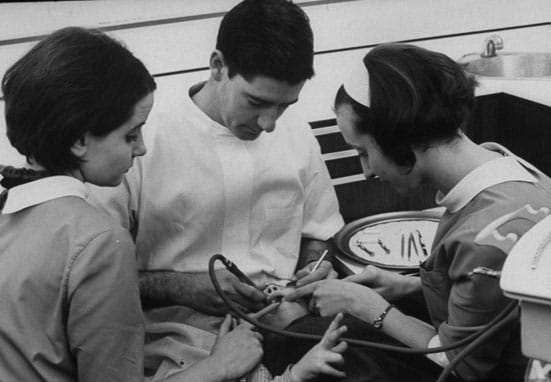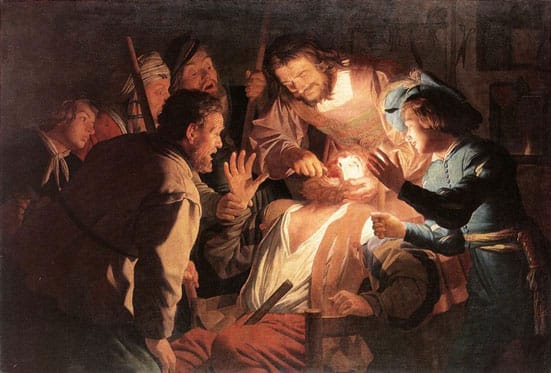I went to the dentist for the first time in nearly ten years a few months ago. It was, as I had feared it would be, a terrible experience that has vastly strengthened my resolve to avoid, at all costs, a return trip. Some people deride my apparently juvenile resolve and my timorous overreaction to something so mundane, so procedural; but I personally believe that there is nothing so wrong, nothing so unutterably invasive – nothing so degrading and defiling that exists within a consensual and lawful scenario.
*
A jab of lidocaine into the poor, tenderized gum that surrounds my offending teeth. That seals my fate: I am primed. It would be extravagant not to conduct some surgery – any surgery – in my anaesthetised mouth.
The nurse on my left gingerly lowers a pair of over-sized black-plastic sunglasses over my eyes; a demeaning consolation for the halogen lamp that hums a foot above the dentist's head; which in turn bobs inches from mine. He might say something reassuring at this point, only it's laced with a banal, rehearsed deceit. Pathetically, I croak a requital, muffled and inarticulate, behind my tongue that sits cowering at the back of my mouth, acting as a desperate barrier between my quarantined mouth and the rest of my agoraphobic innards. Deciding that the sunglasses weren't enough, the nurse to my left completes my wretched costume with a small plastic hoover she hooks over my left cheek.
*
I saw ‘Marathon Man’ for the first time the other day. It’s most famous for it’s dentistry/torture scenes, where Lawrence Olivier as a Nazi-dentist, Szell, coolly pokes, scrapes, pulls and – finally... terribly – drills Dustin Hoffman’s teeth, torturing him for the correct answer to the elliptical question, “Is it safe?” It’s a terrifying sequence that perfectly employs the speculative horror of a specialist gone bad – a professional who knows what quivering nerves to avoid and what palliative to administer, perverting that mandate and reversing their intent. A situation that relies so heavily and so invisibly on trust; where the patient/victim sits/lies under the knife/sickle probe, bud bur, half hollenbach, bin angle chisel, curette, k-file and mouth mirror of the dentist, lowering their defences and opening themselves up for intimate visitations of hygiene maintenance/agony.
Olivier’s dentist-Nazi was apparently based on a Dr. Josef Mengele, who plied his terrible trade at Auschwitz and was in hiding in South America during the production of 'Marathon Man'. Even Olivier's character’s sobriquet to his victims, “Der Weiße Engel”, has echoes of “Onkle Mengele”, as he was known to the Romani children he would lead by the hand to the gas chamber. The torturous experiments that were undertaken in the name of science by those Nazi physicians such as Mengele provide the awful patina of the torture scenes in ‘Marathon Man’. Hoffman, a guiltless, Jewish American, who’s father spoke out against McCarthyism, and who is writing a thesis on tyranny in the history of the American government; is the one who is erroneously strapped to a chair and abused by Olivier’s Nazi-dentist. It's an absurd echo of the arbitrariness of death in the camp, the casual banality with which torture and murder were meted out completely without contrition.
The torture scenes in 'Marathon Man' had to be cut significantly, after some members of the test-screening audience passed out and others vomited in the aisles. It's hard to imagine such a physical reaction today being cause for editorial intervention. Torture's ubiquitousness in film and TV – it's proven box-office lure – terminally undermines the possibility for an authentic, striving empathy for victims of extreme violence in reality. Authenticity in simulation is the new zone of empathy delineated by the entertainment industry – a place where vomiting or passing out is the ultimate expression of rapport: a solely physical, visceral recognition of solidarity.
Dustin Hoffman (“Babe”, in the film) bears the marks of Lawrence Olivier’s depraved handiwork throughout the rest of the film. Particularly visible are a dark-grey hole in one of his two front teeth; and a missing chunk and a hairline crack in the other. He delicately sucks saliva past his teeth, circulates soothing air between them, desperately presses his tongue against their crazed surfaces, and tenderly rubs a finger of clove oil onto his bruised, bleeding gums.
*
Martin Amis’s teeth have been much discussed. In fact, he’s been accused of odontophilia, a tooth-obsession, and he spent quite a large chunk of his autobiography, ‘Experience’, discussing his own. After years of neglect and an unshakable and excruciating toothache, he visits the dentist, only to be told that his teeth will have to be removed. All of them. His lower jaw required reconstructive surgery post-pulling, and his entire face was irrevocably different – smiling, speaking, and eating all had to be re-learnt with a new, dummy mouth. All plastics and wires lining and plumbing his head. My partner’s grandfather Bert had all his teeth pulled when he was pretty young. In sympathy, and to save time later in life, his wife Vi had all hers removed too, despite their being in perfectly good condition.
*
The dentist declares that the anaesthetic should have taken effect, though I can’t tell – my mouth is locked agape. Outside of my peripheral vision, he’s preparing his drill with little clicks, then a rev – and he lurches (swivels? Is he on a swivel chair?) back into view – this time sound-tracked by a high-pitched whine that, as it enters my mouth, forcibly provides the rhythm of my skull. It fills my internal ears, and I can feel the dentist’s weight pressing down on my jaw. The whine slows and deepens with the desperate resistance of my tooth. Flecks of bone, nerve, blood are flung back by the unremitting progress of the drill. A compensatory tide of saliva engulfs the area; trying to obscure the dentist’s target, confuse the drill. But that’s where the plastic hoover comes in, sucking up so much crap like the groping proboscis of a horsefly. It’s only mildly effective – it serves to remove the soothing saliva, but leaves the splinters of enamel free to dive towards the back of my throat, where my terrorised tongue tries to stop them getting any further. I can taste everything: the tepid metallic of my own blood, the foreign grit of my disintegrated tooth. It’s an epic battle in miniature, told through the braille-gropes of my tongue, my taste buds and quivering epiglottis.
Ed Atkins

An Australian dentist working in London in 1967. My Dad used to pretend to be a character called 'The Australian Dentist' in order to get my brother and I to brush our teeth. I have a vague memory of him tapping at the mottled-glass window of the bathroom as we yelped with pleasure and terror, furiously brushing our teeth.

Laurence Olivier as Dr. Christian Szell in 'Marathon Man'

Gerrit van Honthorst - 'The Dentist', 1640